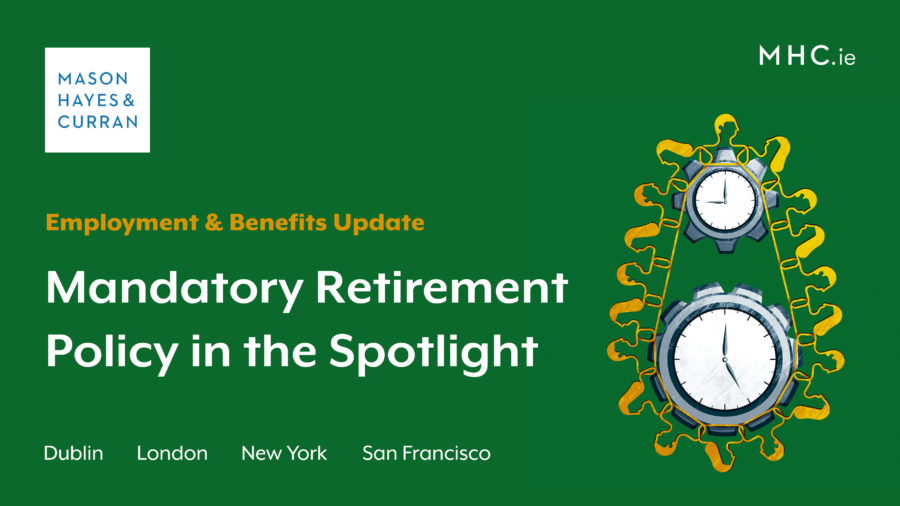Mandatory Retirement Policy in the Spotlight
Workplace Relations Commission Reinstates Retired Employee

A recent decision of the Workplace Relations Commission resulted in the reinstatement of an employee who was subject to a mandatory retirement policy, on the basis of age discrimination. This development is important for employers who implement a mandatory retirement policy. Our Employment & Benefits team review the decision and advise employers on key steps to take.
The Workplace Relations Commission (WRC) recently reinstated an employee subjected to a mandatory retirement policy, based on age discrimination. This development should be considered by employers who implement a mandatory retirement policy.
Ireland’s equality legislation stipulates that it is not discriminatory on the age ground for an employer to fix different ages for the retirement of employees. However, the practice does need to be objectively justified by a legitimate aim the means of achieving that aim must be appropriate and necessary. The Industrial Relations Act 1990 (Code of Practice on Longer Working) (Declaration) Order 2017 sets out best practice for managing the engagement between employers and employees in the run-up to an employee’s retirement.
Background
In this case, the complainant commenced work with the employer when he was 61. The employer implemented a mandatory retirement policy of age 65. The complainant was turning 65 on 1 July 2023 and was notified of his upcoming retirement in January 2023. His formal request to work past 65 was refused.
Universal application
The WRC found it noteworthy that the employer’s policy was not applied universally as at least three employees had been previously granted an extension after they turned 65 – one given their critical role in a project, and two due to inadvertence. The WRC accepted that the respondent’s decision to retain these employees was exceptional and did not in and of itself undermine the employer’s retirement policy.
Objective justification
The WRC went on to consider whether there was an objective justification that was reasonably justified by a legitimate aim for having a mandatory retirement age at 65. The reasons provided by the employer included:
- The need to promote intergenerational fairness
- The necessity for effective succession planning, and
- The importance of maintaining age balance in the workforce to uphold the individual dignity of an employee, especially in a “safety critical” role, as set out in the policy
In finding that the respondent’s refusal to allow the complainant to work beyond 65 was not objectively justified on any of the grounds set out in the employer’s policy, given his specific role and the nature of the role, the WRC noted that:
- In considering intergenerational fairness and the need to safeguard career pathways, retaining the complainant in his junior role would not impede the career progression of any other employee
- As the complainant worked in a small and non-strategic IT department, and in a non-critical role, succession planning and the desire to maintain age balance in the workplace would not be impacted if the complainant remained employed
- Health and safety concerns raised by the respondent did not apply given that the complainant’s position was exclusively office and desk-based
Individual assessment
In referring to previous cases, the WRC reiterated that the imposition of a retirement age should be individually assessed on a case-by-case basis. In this case there was no evidence that the respondent considered the future job prospects of the complainant and the reduction in his income when deciding to terminate his employment.
In finding that the complainant had established a case of discrimination, the WRC reinstated the complainant, noting his desire to work and the excellent relationship he had with his employer.
Top tips
This case reinforces the importance of organisations maintaining and following a strict policy regarding mandatory retirement ages. We urge employers to:
- Have a valid reason for imposing a retirement age underpinned by legitimate aims, and consistently apply the retirement policy.
- Include a mandatory retirement age in employment contracts if seeking to rely on one
- Carefully draft any refusal to extend a retirement age, having regard to the Code of Practice, the legitimate aim underpinning the policy, and the employee’s personal circumstances
- Remember that by frequently extending a mandatory retirement age for certain employees, the justification for having a mandatory retirement age can be eroded, and policy undermined
- If offering a fixed-term contract to an employee who is over the contractual retirement age, ensure that the (i) offer is objectively justified by a legitimate aim and (ii) means of achieving this aim are appropriate and necessary
- Consult any employees approaching retirement age in advance so they are aware of the employer’s retirement policy and the justification for it
For more information and expert advice, contact a member of our Employment Law & Benefits team.
People also ask
Is mandatory retirement permitted in Ireland? |
The Employment Equality Acts 1998 to 2015 stipulate that it is not discriminatory on the age ground for an employer to fix different ages for the retirement of employees. This, however, is subject to being objectively justified by a legitimate aim and the means of achieving that aim are appropriate and necessary. |
Do I have to retire at 65? |
This depends – only where justified by a legitimate aim and the means of achieving that aim are appropriate and necessary. |
The content of this article is provided for information purposes only and does not constitute legal or other advice.
Share this:




